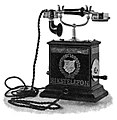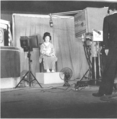The Telecommunication Portal

Telecommunication, often used in its plural form or abbreviated as telecom, is the transmission of information with an immediacy comparable to face-to-face communication. As such, slow communications technologies like postal mail and pneumatic tubes are excluded from the definition. Many transmission media have been used for telecommunications throughout history, from smoke signals, beacons, semaphore telegraphs, signal flags, and optical heliographs to wires and empty space made to carry electromagnetic signals. These paths of transmission may be divided into communication channels for multiplexing, allowing for a single medium to transmit several concurrent communication sessions. Several methods of long-distance communication before the modern era used sounds like coded drumbeats, the blowing of horns, and whistles. Long-distance technologies invented during the 20th and 21st centuries generally use electric power, and include the telegraph, telephone, television, and radio.
Early telecommunication networks used metal wires as the medium for transmitting signals. These networks were used for telegraphy and telephony for many decades. In the first decade of the 20th century, a revolution in wireless communication began with breakthroughs including those made in radio communications by Guglielmo Marconi, who won the 1909 Nobel Prize in Physics. Other early pioneers in electrical and electronic telecommunications include co-inventors of the telegraph Charles Wheatstone and Samuel Morse, numerous inventors and developers of the telephone including Antonio Meucci, Philipp Reis, Elisha Gray and Alexander Graham Bell, inventors of radio Edwin Armstrong and Lee de Forest, as well as inventors of television like Vladimir K. Zworykin, John Logie Baird and Philo Farnsworth.
Since the 1960s, the proliferation of digital technologies has meant that voice communications have gradually been supplemented by data. The physical limitations of metallic media prompted the development of optical fibre. The Internet, a technology independent of any given medium, has provided global access to services for individual users and further reduced location and time limitations on communications. (Full article...)
Selected article -

The history of telecommunication began with the use of smoke signals and drums in Africa, Asia, and the Americas. In the 1790s, the first fixed semaphore systems emerged in Europe. However, it was not until the 1830s that electrical telecommunication systems started to appear. This article details the history of telecommunication and the individuals who helped make telecommunication systems what they are today. The history of telecommunication is an important part of the larger history of communication. (Full article...)
General images
Things to do
 |
Here are some tasks awaiting attention:
|
Selected biography -
Guglielmo Giovanni Maria Marconi, 1st Marchese of Marconi (/mɑːrˈkoʊni/; Italian: [ɡuʎˈʎɛlmo marˈkoːni]; 25 April 1874 – 20 July 1937) was an Italian electrical engineer, inventor, physicist and politician known for his creation of a practical radio wave-based wireless telegraph system. This led to Marconi being credited as the inventor of radio and sharing the 1909 Nobel Prize in Physics with Karl Ferdinand Braun "in recognition of their contributions to the development of wireless telegraphy". His work laid the foundation for the development of radio, television and all modern wireless communication systems.
Marconi was also an entrepreneur and businessman who founded the Wireless Telegraph & Signal Company (which became the Marconi Company) in the United Kingdom in 1897. In 1929, Marconi was ennobled as a marchese by Victor Emmanuel III. In 1931, he set up Vatican Radio for Pope Pius XI. (Full article...)
Did you know (auto-generated) -

- ... that the founding manager of an Oregon radio station named it after his wife's former name?
- ... that the 40-foot radio telescope at Green Bank Observatory was the first automated telescope?
- ... that Roswell, New Mexico, radio station KBIM was so successful that its owner was able to start two other stations with its profits?
- ... that an Illinois radio station closed down to reduce interference with television reception?
- ... that just four years after starting up, the president of Satellite Television & Associated Resources commented that his entire industry had "gone down the drain"?
- ... that a Nebraska public radio station operated from a 1916-built Carnegie library in the 1970s and 1980s?
Related portals
Topics
Subcategories
Associated Wikimedia
The following Wikimedia Foundation sister projects provide more on this subject:
-
Commons
Free media repository -
Wikibooks
Free textbooks and manuals -
Wikidata
Free knowledge base -
Wikinews
Free-content news -
Wikiquote
Collection of quotations -
Wikisource
Free-content library -
Wikiversity
Free learning tools -
Wiktionary
Dictionary and thesaurus




























































































